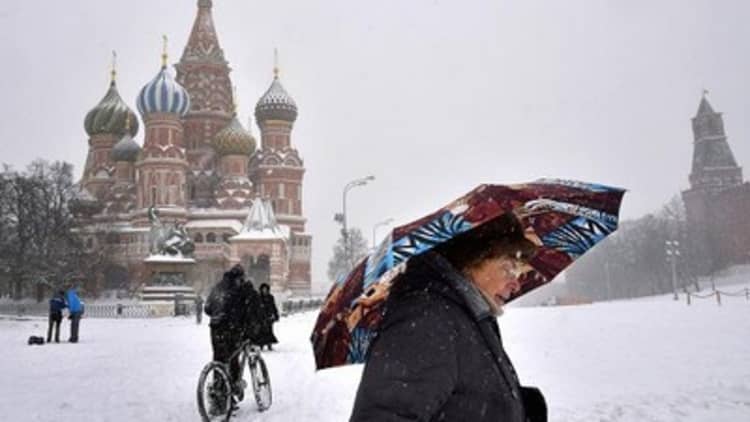Low oil prices are hurting the Russian state as tax revenue tumbles along with crude. But Russia's energy firms aren't feeling the same pain, and they may in fact weather the cheap oil storm better than their international peers.
Experts point to two major factors helping the companies in a low-price environment: Moscow's tax rate on producers shifts lower as the price of oil falls (meaning the cost is mostly borne by the state), and most of the oil companies' expenses are denominated in rubles.
Together, those factors largely offset any negative impact from oil prices, Goldman Sachs energy analyst Geydar Mamedov wrote in a recent note.
Read MoreWhat is Russia's Vladimir Putin playing at?
The currency point is key: Russian energy companies' expenditures are largely conducted in rubles because there is a strong local oilfield services sector, and their revenues are dollar-denominated. So as the Russian currency has fallen against the dollar, the firms have been nearly totally insulated from oil's price decline.
"In the short term, there is definitely a natural buffer built into the system through the ruble," Ildar Davletshin, Renaissance Capital oil and gas analyst, told CNBC. "The ruble has halved over the past 12 months; that's a natural hedge against weak oil prices."

Mamedov noted that at $110 oil and 33 rubles to the U.S. dollar, Russian upstream free cash flow for the companies his group covered was roughly the same as now, with oil near $60 and 60 rubles per U.S. dollar.
Meanwhile, while many international oil companies outside Russia are cutting back on production, Mamedov wrote that he does not expect to see a slowdown in Russian upstream activity. (Russian refiners, on the other hand, could take a hit because of how the tax scheme works).
In fact, Goldman predicts that Russian production will increase to 532 million tonnes in 2015 from 527 million tonnes in 2014.
Longer term, things are less rosy
Despite those short-term positives, Davletshin said he "wouldn't be too optimistic" in the medium or long term. Local costs may catch up with the currency differentials as inflation accelerates, and sanctions are hurting the companies by depriving them of international technology-sharing opportunities, he explained.
"I'm not saying Russia cannot move on its own, but it will take longer," he said.
Read More'Storm is coming': Russians still fear crisis
Options are limited for investors looking to play the sector, as the field is largely priced to perfection after a recent rally, Davletshin said.
Although he had originally recommended buying Lukoil and Tatneft at the outset of the year, both of those stocks have already seen solid gains, Davletshin said. Now, he added, the only stock in the sector with room to run is Gazprom Neft, a subsidiary of Gazprom that trades on a lower price-earnings ratio than its peers.
He has a buy rating on the stock, and a $19 price target; Gazprom Neft traded Friday near $15.


